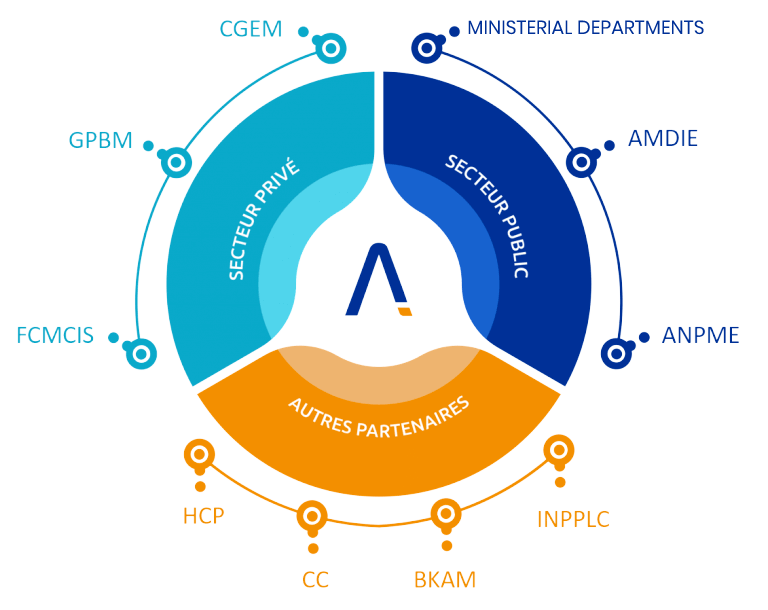National policy for the improvement of business environment in Morocco

The National Business Environment Committee (NBEC), created in 2009 and institutionalized by virtue of Decree No. 2-10-259 of October 29, 2010 (corresponding to 20 Kiida 1431 Anno Hejirae), is a public-private body chaired by the Head of Government, whose mission is to coordinate the government’s strategy relating to the business environment.
NBEC
- National Business Environment Committee (NBEC)
RBEC
- Regional Business Environment Committee (RBEC)
National Business Environment Committee

Presentation
The NBEC ensures the development and improvement of the business climate in the Kingdom in order to facilitate the entrepreneurial activity, and this through, in particular, the modernization of the legal and regulatory business framework, the simplification and the digitalization of the administrative procedures applying to business as well as the identification and the creation of single points of contact.
Members
Being a structure for public-private partnership, the NBEC brings together ministerial departments, representatives of the private sector, as well as several partners involved in the development of the private sector and the improvement of business environment in Morocco.
Steering
The NBEC operates according to an annual actions plan, prepared according to a rigorous process, and approved at a meeting chaired by the Head of the Government. This meeting is attended by all Committee members, in their capacity as ministers representing ministerial departments, or presidents of other public or private bodies.
A special team, reporting to the Head of Government, coordinates the implementation of the actions planned together with the different working groups set up for this purpose including the private sector.
Doing Business 2021 : Morocco on the right track
Morocco has put in place a 2018-2021 roadmap with the objective of joining the top 50 countries in terms of business environment. In the latest ranking, Morocco is ranked 53rd out of 190 countries, compared to 128th place before the creation of the National Business Environment Committee (NBEC). Morocco’s positive score in this new global ranking is due to the adoption of a series of important measures and reforms related to business and Moroccan companies’ activities, which are part of the NBEC’s work program. The publication of the 2021 report is eagerly awaited to confirm whether or not the Kingdom has achieved its goal of being ranked among the top 50 economies in the world in terms of business environment improvement.
Doing Business
Significant progress made by Morocco over the past 10 years
Simplification of many administrative procedures (digitization of key public services)
Facilitating many business processes by simplifying and modifying the regulatory system.
Better support for companies and investors
Contributions of the national policy for the improvement of business environment in Morocco 2021-2025
The adoption of the national policy for the improvement of business environment in Morocco 2021-2025, takes place in application of the High Royal Guidelines regarding the imperative to set-up a strategic vision aimed at improving the business environment, recalling the message sent by HM the King to the participants in the 2nd International Conference on Justice, held in October 2019 in Marrakech, in which the Sovereign had stressed that “the need to develop a strategic vision for the improvement of the business environment. A core element of that vision should be the creation of conditions conducive to investment and the adoption of a modern, integrated legal system that makes businesses a driving force of economic and social development.” Based on this Royal orientation, a steering committee was set up within the framework of the NBEC with the mission of developing an integrated national policy aimed at improving the business climate.
The main contributions of this new policy revolve around three pillars :
Improving business environment conditions
Facilitating access to necessary resources for businesses
Strengthening collaboration, transparency and inclusion
The main challenges

Challenge 1

Challenge 2

Challenge 3

Challenge 4

Challenge 5

Challenge 6

Challenge 7
Challenge 1
Simplifying administrative procedures

Challenge 2
Adapting the regulatory framework and making it accessible

Challenge 3
Reduce companies’ financial constraints

Challenge 4
Strengthen human capital potential and performance

Challenge 5
Improve infrastructure accessibility and quality

Challenge 6
Strengthen public-private collaboration

Challenge 7
Ensuring a healthy environment



